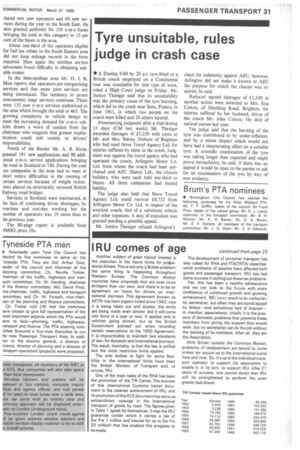IRU comes of age
Page 33

If you've noticed an error in this article please click here to report it so we can fix it.
Another subject of great topical interest is the reduction in the hours limits for professional drivers. This is not only a British problem; the same thing is happening throughout Western Europe. The Common Market countries have proposals that are even more stringent than our own, and there is to be an agreement on hours for drivers on international journeys. This agreement (known as AETR) has been pigeon-holed since 1962; now it is being taken out and dusted, the limits are being made even stricter and it will come into force in a year or two. It applies only to vehicles going abroad, but as the British Government pointed out when recording certain reservations to the 1962 Agreement, it is impracticable to maintain two standards. of law: for domestic and international journeys. The result, inevitably, is that the law is unified and the more restrictive limits applied.
The only bodies to fight for some flexibility in the international limits have been the British Ministry of Transport and, of course, IRU. One of the main tasks of the RHA has been the promotion of the TIR Carnet. The success of this international Customs transit document is the clearest achievement of IRU. and its promotion of this ECE document has led to an extraordinary upsurge in the international transport of goods by road. The figures given in Table 1 speak for themselves. It was the IRU guarantee (under which it carries a risk of Sw frs 1 million and insures for up to Sw Frs 20 million) that has enabled this progress to be made. The development uf container transport has also called for R HA and FTA(TRTA) expertise, while problems of taxation have affected both goods and passenger transport. IRU has had some success in sorting out these tax problems.
Yes, this has been a healthy adolescence and we can look to the future with every confidence of continued growth and growing achievement. IRU owes much to its enthusiastic secretariat, but often they are handicapped by delays—and sometimes lack of interest— in member associations: chiefly it is the pressure of domestic problems that prevents these members from giving the support they would wish, but no secretariat can do the job without the backing of its members. After all, they are the Association.
With Britain outside the Common Market, problems of readjustment are bound to come unless we square up to the international scene here and now. So, it's up to the individua I transport operator to support his association to enable it, in its turn, to support IRU. After 21 years of success, one cannot doubt that IRU will be strengthened to perform the even greater task ahead.
























































































































